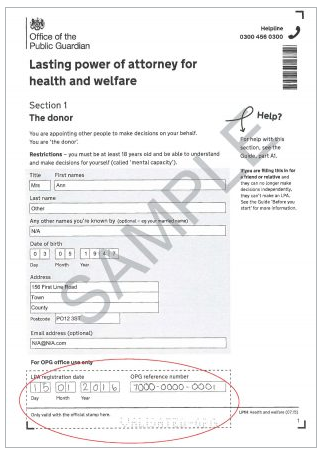Should I register my LPA straight away or wait until I need it?
Some people make a Lasting Power of Attorney (LPA), but don’t validate it immediately choosing instead to wait until they need it. Recently I was asked if there was an expiry date on the time from creating an LPA to validating it; the current information is that there is no expiry. Previously an LPA had to be registered within a year, but that has now changed; as long as the document has been drafted correctly and signed in the correct order there is not a limit on the date it was signed to submitting it for registration. Does this mean it’s best to wait or to register immediately? This blog explores the two options.
How do I know if my LPA has been registered?
Once a Lasting Power of Attorney (LPA) has been created it must be registered with the Office of the Public Guardian, until registered it cannot be used. If you are ever unsure whether the LPA has been registered, check the document for the perforation at the bottom which says VALIDATED. The picture below shows an example of a validated LPA.
Should I register my LPA as soon as it’s made?
I would always argue yes, indeed I struggle to think of good reasons not to. The process of registration is currently taking around 20 weeks, and that’s if there are no problems; any mistakes on the form can see this process considerably delayed.
Why is it important to register the LPA as soon as it’s made?
It’s impossible to know when an LPA might be needed, we know from Headway that every 90 seconds someone is admitted to hospital with an acquired brain injury. Data from the Office of the Public Guardian also shows us that 72% of people wrongly believe that their next of kin has the right to speak for them.
If you have a sudden accident and your LPA has not been registered, it will take around 20 weeks for the process to complete; during this waiting period, your next of kin has no authority to make decisions on your behalf; medical decisions need consent of the person involved before a next of kin can make treatment decisions. Critical issues may need a swift decision not the delay of a 20 week wait.
How to register a Lasting Power of Attorney
Once all the paperwork has been complete and signed in the correct order, you register an LPA by sending it, with the appropriate fee to:
Office of the Public Guardian
PO Box 16185
Birmingham
B2 2WH
Online forms will need printing before signing, if you have made an older LPA on the paper forms:
How to register a Lasting Power of Attorney
Once all the paperwork has been complete and signed in the correct order, you register an LPA by sending it, with the appropriate fee to:
Office of the Public Guardian
PO Box 16185
Birmingham
B2 2WH
Online forms will need printing before signing, if you have made an older LPA on the paper forms:
You can register by filling in form LP2 if you made your LPA:
on forms LPA114 or LPA117 before 1 January 2016
on forms LP PA or LP PW before 1 April 2011
Otherwise you’ll need to make a new LPA.
Call to action
I believe passionately in proactive Advance Care Planning and this means having plans in place before they are needed rather responding to a sudden crisis. Choosing a trusted person to speak for you if you ever lost capacity is one very important part of proactive Advance Care Planning and one, I would argue, that should never be left too late.
If you would like to find out more about making your Lasting Power of Attorney or find out more about Proactive Advance Care Planning, contact me.


